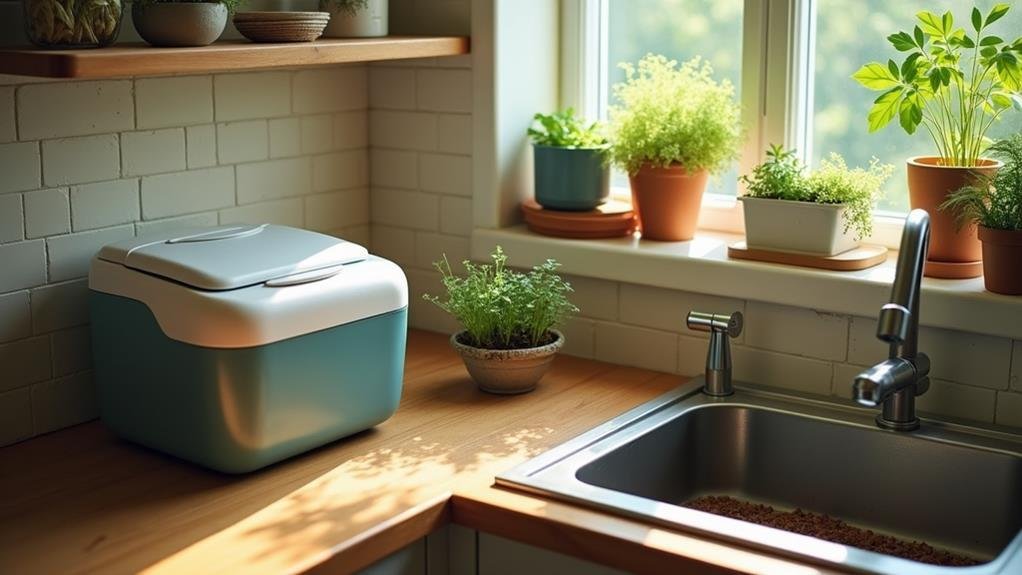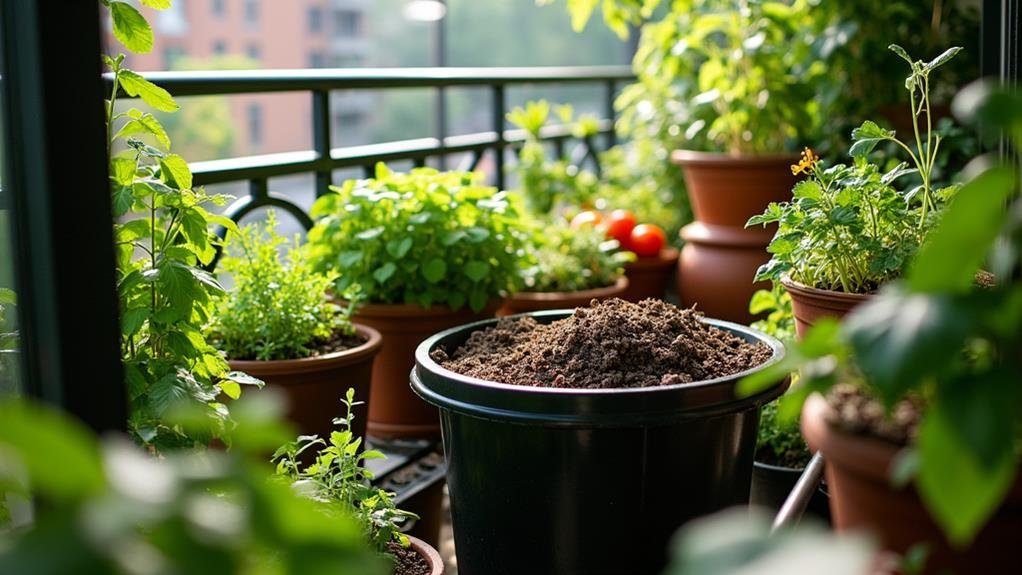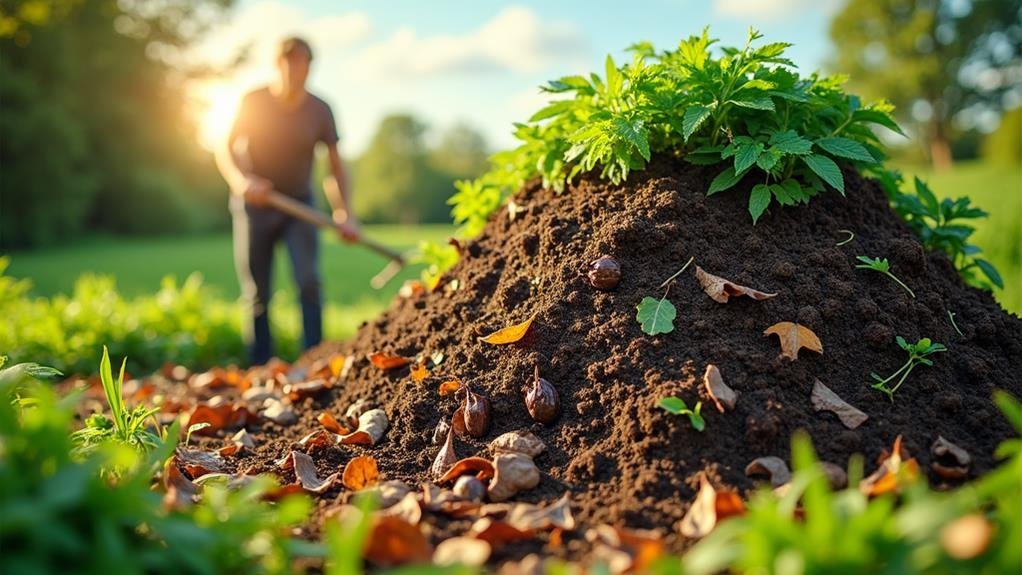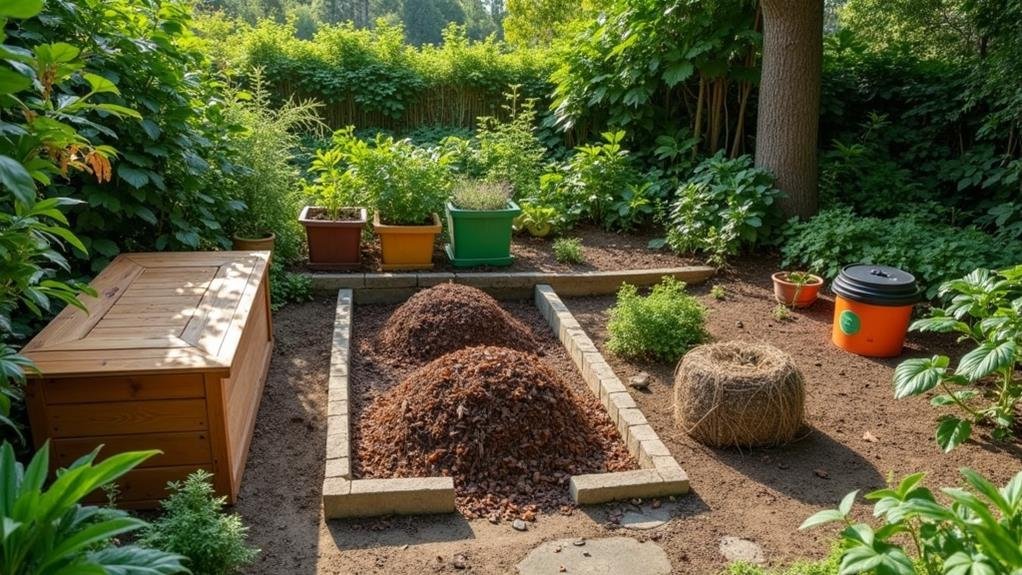If you think composting is only for those with sprawling backyards, you might be surprised to learn it's entirely feasible in small spaces. You can start by choosing the right composting method that fits your limited area, and once you've got that sorted, it's all about utilizing space-efficient containers. But even with the best setup, maintaining your compost effectively is essential for success. Curious about how to maximize your composting efforts without sacrificing space?
Choose the Right Composting Method

With regard to composting in small spaces, selecting the right method can make all the difference. You've got a few options, and the best choice depends on your lifestyle and available space.
If you're short on outdoor area, consider vermicomposting, which uses worms to break down organic waste. It's compact, odor-free, and even produces nutrient-rich worm castings for your plants.
Another option is bokashi composting, a fermentation process that works well inside your home. This method involves adding a special mix of bran and microorganisms to your food scraps, breaking them down without the need for oxygen. It's quick and can handle meat and dairy, which traditional composting often can't.
If you do have some outdoor space, you might look into a tumbling composter. These are efficient and allow for quick mixing of materials, speeding up decomposition.
Whatever method you choose, make sure it fits your routine and space requirements. After all, the goal is to make composting easy and sustainable for you.
With the right approach, you can enjoy the benefits of composting without feeling overwhelmed.
Utilize Space-Efficient Containers
Choosing the right composting method is just the first step; how you store your compost materials can also impact your success. For small spaces, using space-efficient containers is essential. Look for compost bins that fit neatly in your kitchen or balcony. Many compact designs are available, like tumblers or stackable bins, which maximize your limited space.
Consider using a countertop compost bin for kitchen scraps. These small containers keep odors at bay while making it easy to collect organic waste. Once full, you can transfer the scraps to a larger outdoor bin or a worm composting bin if you're feeling adventurous.
If you prefer outdoor composting, a vertical composter is an excellent option. These containers take up minimal ground space while allowing for proper aeration. A composting bag can also work well; it's lightweight and can be hung or placed in a corner.
Remember to choose materials that are durable yet lightweight. This way, you can easily move your compost container as needed.
With the right containers, you can efficiently compost in even the smallest of spaces, contributing to a healthier planet without sacrificing your living area.
Maintain Your Compost Effectively

To keep your compost thriving, regular maintenance is essential. Start by turning your pile every few weeks. This aeration encourages decomposition and helps prevent unpleasant odors. Use a pitchfork or shovel to mix the materials, ensuring that air reaches the inner layers.
Moisture levels are important, too. Your compost should be as damp as a wrung-out sponge. If it's too dry, sprinkle some water; if it's too wet, add brown materials like dry leaves or cardboard. This balance helps speed up the composting process.
Keep an eye on the temperature. If it gets too hot, turn the pile more often to cool it down. Conversely, if it's cold, you might need to add more green materials, like kitchen scraps, to rev up the heat.
Lastly, be patient. Composting takes time, and it's a natural process. Depending on the conditions, you might see results in a few weeks to a few months.
Conclusion
Composting in small spaces doesn't have to be a challenge. By choosing the right composting method, utilizing space-efficient containers, and maintaining your compost effectively, you can create nutrient-rich compost right in your kitchen or backyard. With these simple tips, you'll reduce waste and improve your gardening efforts without feeling cramped for space. So roll up your sleeves and start composting; your plants—and the planet—will thank you! To make the most of your small space composting, consider using organic composting methods such as vermicomposting or Bokashi composting. These methods are efficient and can be easily managed in small spaces like apartments or urban gardens. By using these methods, you’ll be able to transform your kitchen scraps and yard waste into valuable compost without needing a lot of space.



